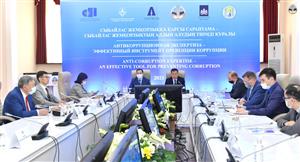- Main page
- News
ANTI-CORRUPTION EXPERTISE RESULTS DISCUSSED
4/16/2021
ANTI-CORRUPTION EXPERTISE RESULTS DISCUSSED
The Al-Farabi Kazakh National University hosted an international conference on scientific anti-corruption expertise of RLA projects "Anti-corruption expertise is an effective tool for preventing corruption."
The conference was attended by Chairman of the Board-Rector of the Al-Farabi Kazakh National University Zhanseit Tuimebayev, Deputy Executive Director of the Nursultan Nazarbayev Foundation, member of the Scientific Advisory Council under the Constitutional Council of the Republic of Kazakhstan, Chairman of the Public Council of the Agro-Industrial Complex Igor Rogov, Ambassador Extraordinary and Plenipotentiary of the Kingdom of the Netherlands Andre Carstens, President of the Fund for the Development of Parliamentarism in Kazakhstan Zauresh Battalova, representatives of government bodies, Kazakhstani and international experts from Moldova, Turkey and Central Asian countries, as well as representatives of civil society institutions.
The organizers of the event were: KazNU named after al-Farabi, “Research Institute of State and Law named after G. Sapargalieva ”, the Agency of the Republic of Kazakhstan on Combating Corruption,“ Nursultan Nazarbayev Foundation ”, PF“ Fund for the Development of Parliamentarism in Kazakhstan ”.
Welcoming the participants of the international scientific and practical conference, the Rector of KazNU Zhanseit Tuimebayev noted that the First President of the country - Elbasy Nursultan Nazarbayev in his Messages defined the main program directions of the fight against corruption - this is a reduction in the control functions of the state, controllability and transparency of their work, the state apparatus, a decrease in the state interference in the economy and business.
Continuing the policy of the First President, the President of the Republic of Kazakhstan Kassym-Zhomart Tokayev identified the main directions of anti-corruption policy and emphasized the need to restore anti-corruption expertise, draft regulatory legal acts of central and local authorities with the participation of experts and the public. As part of the implementation of the policy of the President of the Republic of Kazakhstan, on the basis of Al-Farabi KazNU, since November 2020, the coordination of scientific anti-corruption expertise of regulatory legal acts has been carried out. For 5 months, 5016 examinations of draft regulatory legal acts were carried out, for which conclusions were prepared to eliminate 13,430 corruption factors. As a result of comprehensive work, the economic effect of anti-corruption expertise, according to preliminary data, amounted to 3.7 billion tenge. Each examination is carried out on a special portal "Saraptama", which allows you to automate the distribution of projects among experts, taking into account their qualifications and workload. The foundation of the effectiveness of anti-corruption expertise is a pool of experts, the selection of which is carried out on the basis of the principle of openness, transparency and publicity.
To ensure broad participation of citizens in this work, the register is periodically updated, currently it consists of 146 experts.
Al-Farabi KazNU is a long-standing and strategic partner of the Agency for Combating Corruption of the Republic of Kazakhstan. The university acts as a center for scientific thought, a dialogue platform and a coordinator of creative ideas of the Anti-Corruption Agency.
Ganizhan Asanuly, director of the integrity department of the agro-industrial complex of the Republic of Kazakhstan, also spoke at the conference. He dwelled on the issue of restoring the scientific anti-corruption expertise of draft normative legal acts (RLA), which are aimed at identifying and eliminating corruption-related norms. Last year alone, following the results of over 200 external analyzes, amendments were made to 70 laws and regulations in terms of risk exclusion. The main innovation in this work was the widespread involvement of members of the public and the academic community, who showed particular interest in the process of rebuilding this institution. “More than 600 people have expressed a desire to take part in the anti-corruption expertise. Based on the results of competitive selections, 146 of them were included in the relevant register. The experts have done a tremendous job. On average, each expert conducted 30 examinations of regulatory legal acts per day, ”said the director of the department for integrity of the agro-industrial complex of the Republic of Kazakhstan.
Last year, the anti-corruption expertise of a new format covered 5,000 draft laws and regulations, where 13,000 corruption risk factors were identified. As it was said, most of them were associated with legal gaps, double formulations and conflicts of law. In this regard, an emphasis was placed on improving the quality of the draft laws and regulations being developed and ending the practice of using double interpretation of norms that allow making decisions at their own discretion.
Deputy Executive Director of the Nursultan Nazarbayev Foundation, member of the Scientific Advisory Council under the Constitutional Council of the Republic of Kazakhstan, Chairman of the Public Council of the Agro-Industrial Complex Igor Ivanovich Rogov spoke about the significance and importance of restoring anti-corruption expertise. It was noted that the main initiator of the first anti-corruption law was the First President-Elbasy N.A. Nazarbayev.
During the conference, the following speakers spoke: an international expert on anti-corruption, ex-deputy head of the National Anti-Corruption Center of the Republic of Moldova Tserne Cristina, scientific director of the Foundation for the Development of Parliamentarism in Kazakhstan on the right to participate in the management of state affairs, candidate of legal sciences, constitutionalist Mereke Gabdualiev, Ambassador Extraordinary and Plenipotentiary of the Kingdom of the Netherlands to the Republic of Kazakhstan Andre Carstens and many others. The participants discussed topical issues of the examination, its role in lawmaking, the results of a comparative analysis of corruption risks in various areas.
Press service of KazNU named after al-Farabi

